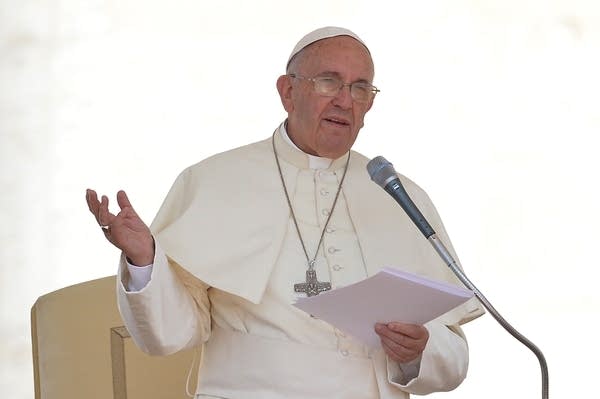'What is an encyclical?' and more questions about the Pope's environmental teaching

Go Deeper.
Create an account or log in to save stories.
Like this?
Thanks for liking this story! We have added it to a list of your favorite stories.
Pope Francis released his much-anticipated teaching document on the environment Thursday, declaring an urgent need for the political and spiritual conversion of global leaders and individuals to dedicate themselves to curbing climate change and ending policies and personal habits that destroy creation.
The document, or encyclical, titled "Laudato Si" (Praise Be), captured world attention well before its release.

What is an encyclical?
Turn Up Your Support
MPR News helps you turn down the noise and build shared understanding. Turn up your support for this public resource and keep trusted journalism accessible to all.
An encyclical is one of the highest forms of teaching from a pope as he interprets Catholic doctrine. The word encyclical, from the Greek word for circle, means "circular letter. Among the better-known encyclicals are "Humane Vitae," the 1968 document on church teaching against artificial contraception, and "Pacem in Terris," on Christian views of human rights, liberty and peace issued by St. John XXIII in 1963, after the Cuban missile crisis.
Has the environment been the subject of previous encyclicals?
No, although previous popes have proclaimed a moral and spiritual duty to protect the environment.
Are Catholics obliged to follow what the document says?
The duty to accept what the pope teaches in "Laudato Si" was much debated months before it was made public, especially among political conservatives and libertarians in the church who reject mainstream climate science or Francis' views on the economy.
Richard Gaillardetz, a Boston College theologian, said Catholics are bound to follow the basic church dogma and social teaching in the document, including those regarding creation and care for the poor.
The pope's call for action based on those teachings also carries "substantial doctrinal authority," Gaillardetz said. Catholics could disagree with a specific policy proposal if they believed an alternative would more effectively fulfill church teaching, but "they could not dismiss the moral imperative" to act on climate change, Gaillardetz said.
Is the document just for Catholics?
Encyclicals are usually addressed to Catholic clergy and lay people, but the documents can have a wider influence. Francis clearly framed "Laudato Si" to have a very broad reach. He quotes Ecumenical Patriarch Bartholomew I, the spiritual leader of the world's Orthodox Christians, who is known as the "green patriarch" for urging believers to make conservation an integral part of their faith. At the end of the encyclical, Francis includes two new prayers for creation: one for Christians and another for non-Christians.
What happens to the document after it's released?
In most cases, encyclicals have a short public shelf-life, becoming topics of internal church debates and theological dissertations far from notice by the wider world. This encyclical could be different.
The pope has said he hopes the document will influence the U.N. end-of-year climate talks in Paris, and he's expected to raise the issue when he addresses the U.N. General Assembly in September. Bishops, priests and Catholic environmentalists around the world are planning sermons and public events to draw attention to the document, hoping to shape public policy and persuade people to change their behavior.


